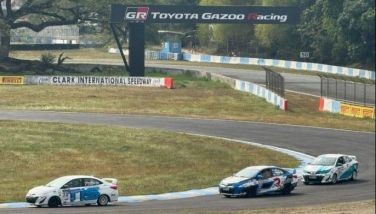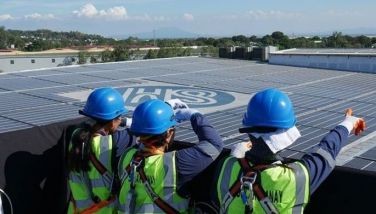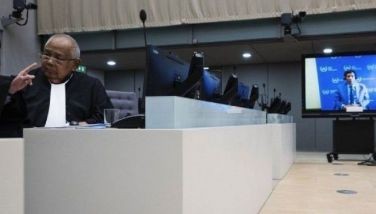Phl wins $5 M against Fraport’s slandering

Good news, just in from Washington, DC:
The Philippines has been awarded $5 million in arbitration against German firm Fraport AG over the NAIA-3. This is the country’s second victory against 56-percent state-owned Fraport, the first for control of the Manila airport terminal. The facility’s construction has been delayed 18 years due to overlapping corruption.
The International Centre for Settlement of Investment Disputes granted the remuneration, equivalent to P225 million. The World Bank arm usually does not entertain monetary claims in bilateral disputes. It did so in this one, the third time ever, because of Fraport’s defamation of the Philippines before the world.
In Fraport’s first two filings in 2004 and 2008, it repeatedly called the Philippines “a country of thieves,” for repealing its contract to build and operate the NAIA-3. Retired Supreme Court justice Florentino Feliciano, who was representing the country along with US counterpart White & Case and the Office of the Solicitor General, protested the insult. In the Philippines’ own filing, Round 3, Feliciano and colleagues stated that the Philippines is striving to do right despite sleazy carpetbaggers. Too, that dignity is more important to the country than anything else.
The badmouthing was not only in Fraport’s case filings. Imperious German officials would berate Filipinos in Europe and counterparts in Manila about supposed maltreatment of Fraport. One of Germany’s largest firms, Fraport is partly owned by the federal government, the state of Hesse, and the city of Frankfurt. Private German stockholders have sued their government reps in the firm for malpractices that led to business losses.
(Two visiting German legislators had yelled at this writer for stating that the NAIA-3 corruption cut both ways, theirs and Manila’s. The German envoy hosting lunch had to apologize for his countrymen’s boorish behavior.)
* * *
Manila’s 2003 expropriation of the NAIA-3 triggered Fraport’s 2004 and 2008 demands for recompense of $425 million investments.
The three original ICSID arbiters dismissed the first case in 2007, on findings that Fraport had broken Philippine laws in the NAIA-3 contract.
One crime was dummying, as Fraport was found to own 61.44 percent of the consortium with Filipino partner Piatco. This was in breach of the Philippine Constitution and the Foreign Investments Act that limit foreign equity in utilities, like airports, to 40 percent. Other crimes were:
• Bribery of Philippine officials through bagman Alfonso Liongson, a kin of the Piatco owners;
• Graft in contracting the Manila airport assistant GM’s firm for excavation works; and
• Doctoring of computer-aided design (CAD) files to simulate completion of construction phases and justify progress billings.
On Fraport’s appeal, three new arbiters in 2011 set aside the first ruling. Supposedly, the original arbiters had ignored the deeds of assignments between Fraport and Piatco, so the Philippines must reimburse the $425 million. Government lawyers had wanted to appeal this ruling, on grounds that the documents belatedly were submitted. Malacañang overruled them, for still unexplained reasons.
Piatco in 2005 had filed a parallel case before the Singapore-based International Chamber of Commerce, for a bigger $770 million. It too lost.
Fraport’s private stockholders had charged their government-appointed executives with, among others, foreign corrupt practices in bribing Philippine officials. Too, with money laundering in the British Virgin Islands, tax evasion, and spotty accounting. One executive was exposed for lewdness, another for adultery, in Manila.
* * *
The NAIA-3 scandal has spanned four administrations. Storm first broke in 1996 when undercapitalized Piatco won the Swiss challenge against the original build-operate-transfer proponent. The latter cried that Piatco’s winning counteroffer was under anomalously different terms of reference.
The project lay dormant till a new President came in 1998. Thrice in that year and 1999 the contract and designs were amended in favor of Piatco. Then came Fraport, operator of the giant Frankfurt international and other European airports. Plunking in capital, Fraport finally began construction in 2000. Yet its true role was to operate the facility upon completion.
Construction went on till 96-percent completed in 2003. By then, a third admin had come in. Under that admin, influential politicos won construction and supply subcontracts. The structure’s stability, accessibility, and utility were marred.
To this day the original general contractor, Japan’s Takenaka Corp., still is finishing the works. It’s rehiring by the transport department, despite faulty design and subcontract collusion with Piatco-Fraport, has been under question. So too is Malacañang’s present weak handling of Fraport’s advances at the ICSID.
* * *
Catch Sapol radio show, Saturdays, 8-10 a.m., DWIZ (882-AM).
Gotcha archives on Facebook: https://www.facebook.com/pages/Jarius-Bondoc/1376602159218459, or The STAR website http://www.philstar.com/author/Jarius%20Bondoc/GOTCHA
E-mail:jariusbondoc@gmail.com
- Latest
- Trending




























